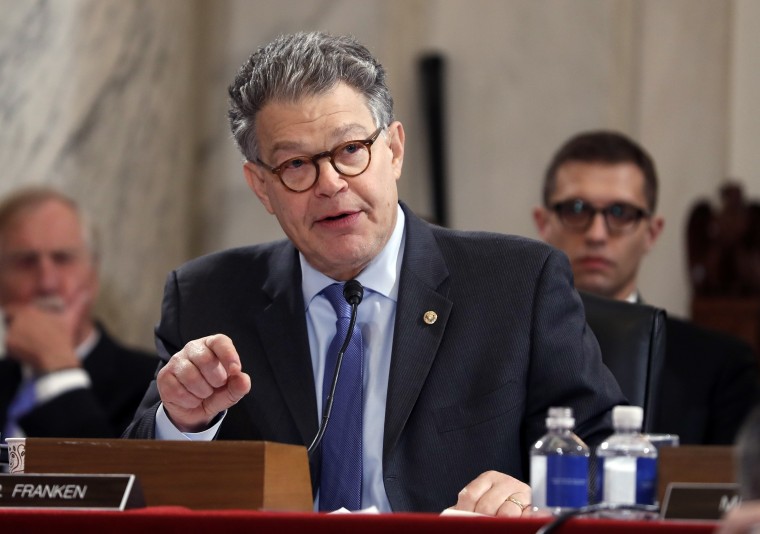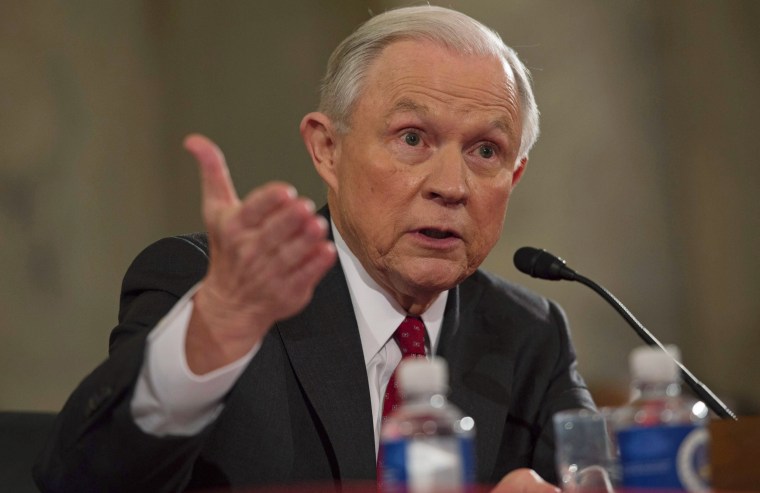On Tuesday, the Senate Judiciary Committee is set to hold its final hearing and vote on Jeff Sessions, President Trump’s nominee for Attorney General. The vote was delayed during last Tuesday’s hearing amid calls for a delay from Democrats and groups like the ACLU. Sen. Dianne Feinstein, D-Calif., requested the hold, citing 200 pages of written answers to questions that Sessions did not submit until the Sunday before the scheduled vote.
Sessions is under the spotlight for several hot-button issues, most notably allegations of past racism and his suspected involvement in drafting Trump’s controversial executive order banning immigration from seven majority Muslim countries. But this week, much of the Judiciary Committee’s examination could focus on Sessions’ record on LGBTQ equality—specifically, on his sponsorship of the proposed First Amendment Defense Act.
President Trump vowed to pass the First Amendment Defense Act, or FADA, if it is reintroduced this congressional term. Rep. Raul Labrador, R-Idaho, and Sen. Mike Lee, R-Utah, have both publicly stated they plan to reintroduce the bill this year. Originally introduced in 2015, the bill failed after critics pointed out its potential to codify discrimination against LGBTQ people, unmarried heterosexual couples and unwed mothers.
Not only does Sessions vocally support FADA, he was one of the bill's original sponsors. Attorneys General rarely come straight from Congress, putting Sessions in the unique position of being tasked with enforcing his own controversial law in a fair and unbiased manner. Further complicating the matter is the fact that Trump’s Health and Human Services nominee, Tom Price, also signed on to the bill.
In December, Lambda Legal Law and Policy Director Jennifer Pizer told NBC Out the bill “violates both Equal Protection and the Establishment Clause by elevating one set of religious beliefs above all others, and by targeting LGBT Americans as a group, contrary to settled constitutional law.”
FADA would prevent the federal government from taking any punitive action against people, businesses or institutions that believe “marriage is or should be recognized as the union of one man and one woman, or that sexual relations are properly reserved to such a marriage.” Specifically, it bans the government from revoking tax-exempt status, issuing fines or penalties, canceling contracts or grants or “otherwise discriminat[ing] against such a person.”
Basically, the act paves the way for colleges, private businesses and government offices to turn away LGBTQ people and anyone else not reserving their sexual relations to a “marriage … of one man and one woman.” And it would leave the government with no recourse to punish such discrimination through financial penalties. For example, a college that issues a new policy stating that only students in heterosexual marriages may attend would not lose any portion of the approximately $76 billion the federal government spends on higher education each year, according to a Pew Charitable Trusts study.

Now, Sessions’ support of FADA is being called into question. In his list of questions for the Attorney General nominee, Sen. Al Franken, D-Minn., asked how Sessions can support a proposed law that would “would sanction discrimination against lawfully married gay and lesbian couples.” Franken called the bill “deceptively named,” pointing out that the First Amendment already protects clergy from, for example, being forced to officiate a same-sex marriage.
Sessions balked at the idea that FADA is “deceptively named,” telling Franken: “The purpose of the legislation was to prohibit the federal government from taking discriminatory actions against any person based on their belief or action in accordance with a religious or moral conviction.” Other supporters of the bill have similarly stressed the concept of federal government “discrimination,” rather than addressing the bill’s protection of those who engage in discrimination.
Franken wasn’t happy with Sessions’ answers to his questions about the bill.
“Contrary to Senator Sessions’ response, federal law does not allow the government to discriminate against someone on the basis of a sincerely held religious belief,” Franken told NBC News. “The First Amendment Defense Act would legalize discrimination, pure and simple.”
Sen. Mike Lee’s spokesperson, Conn Carroll, told NBC News that FADA “explicitly does not preempt state law, so it does not enable discrimination anywhere.” That was a direct response to questioning about how FADA would apply in the 20-plus U.S. states that currently have laws protecting LGBTQ residents from discrimination. Would FADA only apply in half of the country?
The ACLU’s Ian Thompson, a Legislation Representative specializing in LGBTQ policy, told NBC News the bill’s text actually states the opposite—and would evenly apply nationwide.
“The notion that national law can only apply to some states boggles the mind. If FADA passed it would apply in every state,” Thompson said. “At the very beginning of FADA, you will see that it clearly states ‘notwithstanding any other provision of law.’ That’s essentially saying that it overrides any other law.”
Besides, Thompson said, FADA it so sweeping in its reach that it would impact LGBTQ people everywhere, even if state laws did offer protection.
“If you went down to the Social Security office with your partner,” Thompson said, “an employee would be empowered to say ‘I can’t help you because of my religion or morals regarding same-sex couples.’ It would allow a federal contractor in NYC to discriminate despite the Obama executive order. It would allow commercial landlords to reject a same-sex couple or an unmarried couple.”
Regardless of state-level or even local anti-discrimination ordinances, experts say FADA would apply to any entity that receives federal funding. Franken told NBC News that it would “sanction sweeping discrimination.”
“A homeless shelter could turn away a married same-sex couple seeking a safe place to sleep,” Franken explained. “A commercial landlord could refuse to rent to a single mom or a pregnant single woman, because the business doesn’t believe in sex outside of marriage.This is a dangerous bill.”
Ambiguous, confusing language — “notwithstanding any other provision of law” and the use of the term “discrimination” — is part of what makes the true intent of the First Amendment Defense Act so difficult to untangle. Interpretation of FADA’s scope varies wildly, too, between its supporters and its opposition. That could be due to the changing drafts of the bill, which first appeared to allow religious and moral-based discrimination universally, and was later changed to exclude federal contractors, publicly traded companies and hospitals.
But even the version of the bill that excludes hospitals from the right to turn away LGBTQ patients or patients having sexual relations outside of heterosexual marriage would allow an individual employee to opt out, according to Sen. Lee’s spokesperson.
“Pro-life doctors work at hospitals that provide abortion services all the time, but those hospitals don’t force doctors to perform abortions,” said Carroll, who told NBC News the newest draft would likely resemble the version on Lee’s website. “This bill would allow hospitals to work with doctors that believe in traditional marriage in the same way.”
The version of FADA that will be reintroduced to Congress this term has yet to be seen, and despite Carroll’s assertion that FADA will probably exclude hospitals, the only version that was ever actually introduced to Congress did not mention exclusions at all — leaving all businesses and institutions free to claim a moral objection to serving LGBTQ people or unmarried couples.
All versions of FADA so far entrust the Attorney General to press charges against any “independent establishment” that violates the law. That means that if the Equal Employment Opportunity Commission (EEOC) — the federal agency tasked with enforcing civil rights protections in the workplace — were to try and do its job, for example, Sessions could take the agency to court.
“It says to federal agencies like the EEOC that they can’t step in and protect these people,” Thompson said.
The legal scope of FADA isn’t the only criticism it has faced. Clergy of all stripes, including Baptists, have spoken out against the law. In 2016, a group of clergy in Georgia held a press conference where they said FADA would allow adoption agencies to put bias ahead of children’s best interests.
“I find it unacceptable at every level — as a pastor, as a citizen, as a Baptist and as a father,” said Trey Lyon, a pastor at Atlanta’s Park Avenue Baptist Church, according to Baptist News Global.
Progressive Christians have been fighting similar laws, with one 2014 North Carolina lawsuit suing for the right to conduct same-sex marriages when that state still had a ban in place. In both cases, clergy pointed out that religious freedom laws like FADA could be considered unconstitutional because they privilege one set of Christian beliefs over another — not to mention violating the Establishment Clause that states “Congress shall make no law respecting an establishment of religion,” which, ironically, is part of the First Amendment.
